![]()
The Words of Yeon Ah (Lee) Moon (wife of Hyung Jin Moon)
|
|
The Words of Yeon Ah (Lee) Moon (wife of Hyung Jin Moon) |
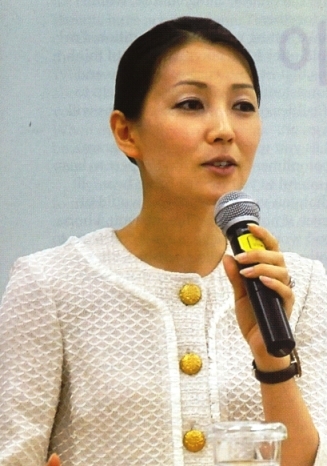
Hosted by the Blessed Family Education Department at Cheon Bok Gung and the World Mission Headquarters.
We are glad the workshop has been a success. I know each of you has come here wishing to make effort to receive God and True Parents' realm of love and then return that love to the members of our second and third generations and to the world's young people. If the international president wished to do so, he could decide everything here at our global headquarters and hand it out to you, saying, "Here! This is the standard you should follow from now on."' Hyung Jin nim could do that, but he doesn't want to set one standard for everyone. He wants to enable us to revise, supplement and develop ideas according to the needs of our own nations. Hyung Jin nim said that it would be arrogant for us to assume that what we have is perfect. Yet, if the program were used in certain locations and good results were achieved, other regions would naturally adopt it. If you have any ideas for improvements, please tell us, because only then will we be able to grow and be of help to those in other areas.
I know that when you return home you will have a lot on your minds. You have learned many things, and you may be anxious to pass them on to others. You may also come across those who are not very interested in Sunday school. Despite this, you will have to plow your way through.
So I thought it would be best to give you some advice before you go. The first thing I want to tell you is that I hope you will work within the organizational system. What that means is that you should always report to your leaders, be they church leaders or continental directors, and tell them things such as "We plan to focus of this or that topic," even if they become tired of your reports. You should also ask the church leaders, the Family Department directors and those working in the Education Department for their opinions.
At first, you might believe that you are right and just go your own way. Things may work out at first, but going your own way will make it more difficult for the program to succeed. Therefore, I am asking you to please work within the church system under your leaders. Though it may seem like slow work at first, in the long run it will mean that the program is more likely to survive.
I also hope that you will bear in mind that not everything you try to do will work out, even if you have good intentions and deeply feel the need and sincerely desire to do it. I strongly recommend that you design a model that can be developed slowly and then be maintained over time.
For instance, when we first started our Sunday school we thought of having a nationwide program in Korea. We followed the program in Cheon Bok Gung for a year, but we found that while certain activities were good in theory they were not so popular with the children. Isn't that how things develop? Based on that progress we adopted a model and expanding to other churches.
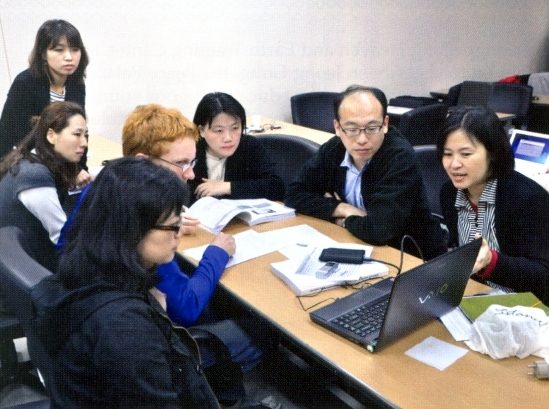
Breakout
sessions had the participants discussing their approach in groups
So when you return to your countries, I think you shouldn't try to take on all the churches in the nation for the time being, but instead take one church at a time. Please choose one church and create a successful model. For the time being, you should put aside thoughts of starting this program nationwide. You might ask what is to be done for the other churches, but for now that can't be helped. Instead of running something incomplete nationwide and failing to meet the expectations and win the confidence of others, it is better to take the long-term view -- begin with one church, and revise and rectify aspects of your program at that church until the program finds its footing, though it may seem unfair to the other churches.
When people criticize you for not carrying out the program nationwide, you should remember to take the long-term view with the thought that you will make a very good program and send it to them when it is done. I strongly recommend that you follow this method. We followed it, though we were criticized in the beginning. People asked, "Does the whole church exist only for Cheon Bok Gung?" Yet, we persevered while we adjusted and improved the program.
When the international president visited Thailand, the national leadership talked about how they were planning to increase the number of churches to ten, and then to sixty. He told them that this was not the way to do things. He said they should begin with one church and make it a good one, and to create more churches following that model. That would be faster, better and far less risky. I remember him saying this, and I believe the same can be applied to our Sunday schools.
So, I hope you will all try this for the first year. We'll help you in any way we can, so please ask us for help if you need it.
The truth is, education is similar to religion in many ways.
At first, no matter how much you invest into it, you can't tell if any good has come of it. Sometimes it even feels as if you are pouring water into a bottomless jar. The effort you put into it just does not show. I think that only after making constant effort for at least a decade will you feel you are finally achieving something. Before you come to feel that way, you have to continue to work hard even though what you are placing your belief in is something invisible.
However, what we are trying to achieve through the Sunday school is more than just educating our children. We are trying to imbue their minds with religion. The outside world has many excellent educational programs. Why, then, are we trying to educate our children in Sunday school?
We are trying to teach them to believe in the Unification Church faith, which is why I think it is a good idea for you to establish a foundation of setting conditions as you work on this. Some people opposed what we were doing. I'm sure this was not because they had bad intentions. All the same, we sometimes faced fierce opposition, and sometimes things didn't work well. We even faced obstacles as we went ahead with the plan to set up this workshop. Yet, we continue moving forward because we have a focal point that brings everyone together, and we have the Cheon Bok Gung culture, within which we set conditions together.
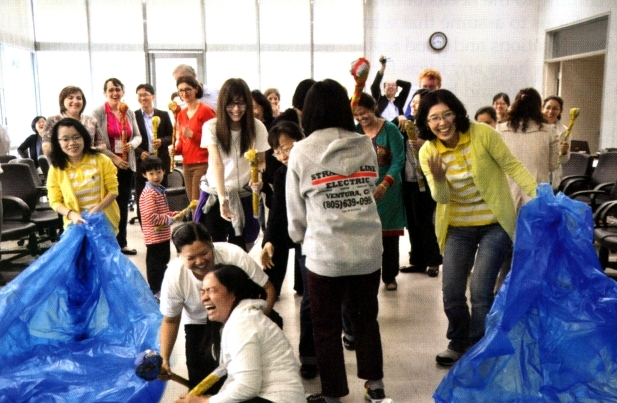
Alas,
the Bible doesn't indicate if the Israelites had as much fun at the
parting of the Red Sea as these Sunday school teachers had when
reenacting it during their workshop
I think you should make setting conditions a tradition. I'm not saying that you should offer 1,200 bows a day, but I think you should set conditions that fit your current situation and that you can carry out consistently. It will be of great help to you. When you face difficulties or opposition, conditions will give you the strength to go on.
Another point is that as you work to set up the program, don't expect to receive compliments for it. Don't expect to hear, "Well done! We are so grateful to you for just being here." If someone does tell you that you've done well, you would of course be grateful, but even if no one compliments you, I hope you will keep up the good work! You have our support team to help you. I'm sure that others will offer you help as well.
My husband has strongly asserted something that I wish to share with you. I believe that True Parents life course will come up in our Sunday schools. Hyung Jin nim asked, "If the Bible had only recorded Jesus' birth and infancy, and not mentioned his life up to his crucifixion, would we have been able to believe in and follow him?" How could we possibly have related to and connected with Jesus? He went on to add that Divine Principle is like the story up to the birth of Jesus in the Bible. In short, the Divine Principle just recorded the beginning.
Divine Principle explains six thousand years of history, beginning with Adam and going on to Noah, Jacob, Joseph, Moses and finally the True Parents. It reveals the history of the providence of restoration and then the book ends. Father's life course, however, continues on, just as Jesus' life did until he was crucified.
True Parents have followed an indomitable course. Our international president expresses that course through a more poetic expression -- seven deaths and resurrections and the completion of the eight stages. In talking about True Father's life course and introducing True Father to others, when we say that he sacrificed himself and risked death seven times to save us and that he delivered us both physically and spiritually, I think we feel more connected to one another. This is because True Father has indeed done so much for us, though we sometimes take it for granted. I think that he has to do these things for us because he is the Messiah.
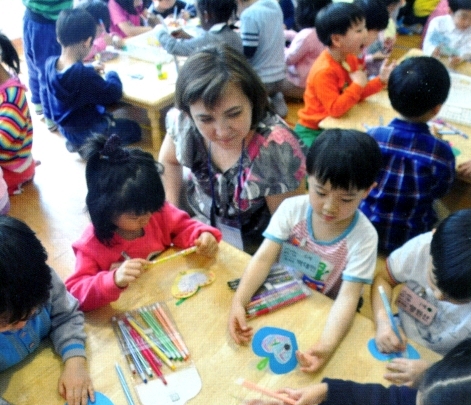
Dealing
with real students in Cheon Bok Gung's Sunday school
True Parents' life course, however, may be a little too much for children to handle all at once, because of how much True Parents have actually done. Therefore, when you teach our children about True Parents' life course, you should focus on the fact that True Parents are the people who have saved us. Whenever you feel that you have given too much information about True Parents' life course and the children seem confused, you should always return to that point and explain it again. When introducing True Parents' life course to others, it might be a good idea to focus on what True Parents have done in your own country. This is something Hyung Jin nim has said.
Hyung Jin nim wants our Unification Church children to make God and True Parents proud. Rather than feeling ashamed of being a Unification Church member or lacking confidence, they should be proud of their faith. To become a proud believer, however, one first needs to be capable. Only when he can stand tall in his society with confidence can he claim to be a proud member of the Unification Church. The Unification Church is not a solitary island; it's part of society, and we need to witness to others in society. In this regard, Hyung Jin nim has said that he hopes our children will become proud members and children of the Unification Church that can give glory to God and True Parents through the talents and abilities they have been given.
Therefore, I hope we can all continue to work with enthusiasm. Our ideals are high and we still have a long way to go. Nevertheless, if we march forward, one step at a time, remembering that we are not alone, we will continue to develop our Sunday school and see our children grow up into wonderful church members. They will come to testify to our True Parents and to God's work. I truly hope and pray that we can sow the small seeds that can bring all this to fruition.
Thank you all for coming.
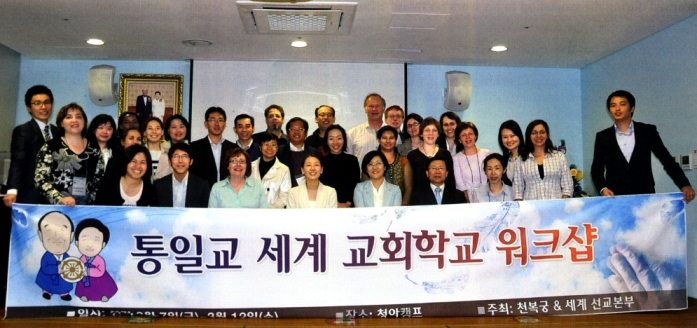
Often, those that prepare seminars and workshops focus solely on what they want to present, whereas at the recent educators workshop, the schedule allowed us to naturally network based on our mutual experiences and concerns. The Cheon Bok Gung Church School Department, which organized the workshop, had designed the schedule with abundant time for participants to get together to just talk and share.
The program provided a relaxed schedule for lunch and dinner breaks, with a good balance of Korean cultural outings, and religious or spiritual outings. For example, one day we visited the beautifully preserved Gyeong Bok Palace, home of Yi Dynasty kings, followed by a trip to Insa Dong, a popular shopping and fashion area. On another day, we visited the Chung Pyung Heaven and Earth Training Center, and then went on to visit Cheon Jeong Gung, the Peace Palace.
As people involved in the education of our young people, including those in our second generation, being able to meet and share through this program left us feeling that we are not alone in working in our individual nations. We are truly part of a larger global community that is tackling the challenges and difficulties of supporting our younger generation.
Some of the presentations introduced the curriculum that Cheon Bok Gung has been developing; others looked at how it is organized into different age levels and how it might empower church schools in other countries. Some workshop sessions involved the participants taking a sample of the curriculum lessons and practicing it.
The thirty or so participants split up into four groups. Each group then presented Sunday school classes for the other three. Consequently, at various times during the week, we found ourselves singing kindergarten Sunday school songs, complete with dance movements and cute facial gestures, drawing pictures with colored pens, or pasting and gluing cutout pictures depicting Joseph's dreams (from the Old Testament). On more than one occasion, laughter would erupt throughout the room, such as when an obviously adult person lifted a stick made of newspapers to represent Moses' staff and then cried out "Red Sea split!" -- meaning that artificial blue waves made by Sunday school staff members should shake and separate like the waves of the Red Sea.
My favorite experience was the class for middle school students presented by team four. After listening to a sermon given by a young brother from Palau, we all engaged in the "extended activity" of playing with wooden dominos while an almost meditative talk was provided in the background by a brother from Taiwan. As our guide, Deng, talked about the significance of finding ways to express our own unique God-given abilities, we spread out, sitting on the wooden floor of the room, and stacked dominoes in a variety of patterns, according to our individual ideas. In the end, we watched each other tip over the lines of dominos to see how they would fall.
Another favorite experience was playing the game Father's Life Course Bingo!, where we had to answer questions on Father's life to block out the squares on our numbered bingo cards, hopefully to be the winners (we did this in three teams).
The method in the workshop (teaching, plus activities) mirrored exactly the approach used by the Cheon Bok Gung Sunday school curriculum, with all the educational material being contextualized for each group -- preschool, younger elementary, older elementary, and then middle school and high school. Likewise, it reflects that each class session comprises a presentation embodying the learning or message for that week and an extended activity, in which the children engage in some practical play that reinforces the lesson and gives them an opportunity to internalize its meaning.
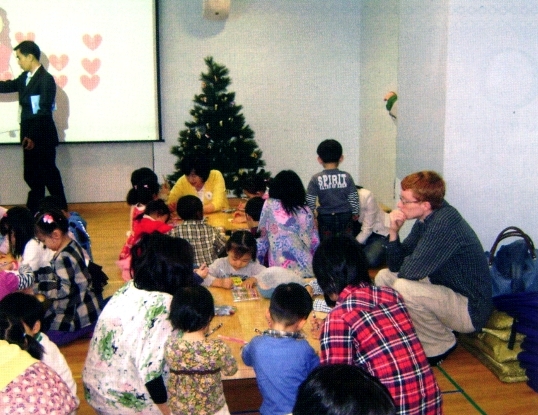
Matthew
Sisserson, who will apply what he's learned during the workshop to
his work on Palau, a Pacific island, observes a Korean Sunday school
class in progress.
Perhaps it was because this same approach was applied to the workshop itself, or perhaps because we were all focused on education for children and young people (whatever the case) this workshop was a lot of fun, and I found myself thinking that we had all become a lot like children ourselves. As we drew pictures and played and acted like kids, our hearts opened and we became like children on the playground together, embraced in True Parents' love and the uplifting vision of the Cheon Bok Gung staff. More than once I found myself thinking that perhaps all our international seminars and workshops should be something a hit like this. The chance to come together and be like kids again was truly an invaluable experience.
The curriculum itself, developed at Cheon Bok Gung over the past few years, is systematic and well-constructed. It was clear to me that there was a massive amount of work and Jeong Seong invested in developing the material. The curriculum employs a modular system that covers various streams over a number of years. One stream focuses on the eight main Unificationist holy days and traditions (one year), while another gives overviews of the Principle and a strong grounding in biblical scripture (two years). The curriculum is designed with material covering both these streams for all different age groups.
We will need to grapple in the months and years ahead with how exactly the curriculum can be translated and localized to suit different cultural and social environments. However, at the very least, the Cheon Bok Gung curriculum is a wonderful and powerful model of how to approach with consistency, wisdom and heart the task of educating our children and young adults in becoming Unificationists that embrace True Parents, not just as someone that Mom and Dad respect but as "my own True Parents," who have been victors in the historic course of completing the eight stages.
I know that virtually everyone at this workshop was in some way inspired or touched by the experience, and more than a few participants were eager to get to work in implementing the material in their home communities. Personally, I was inspired by the Cheon Bok Gung staff's wisdom, and by the vision and heart of our international president and Yeon Ah nim, for investing so much for the future of our families.
I came away with a much stronger sense of how important this aspect of our lives is and with a determination to see that vision multiplied wherever I go.